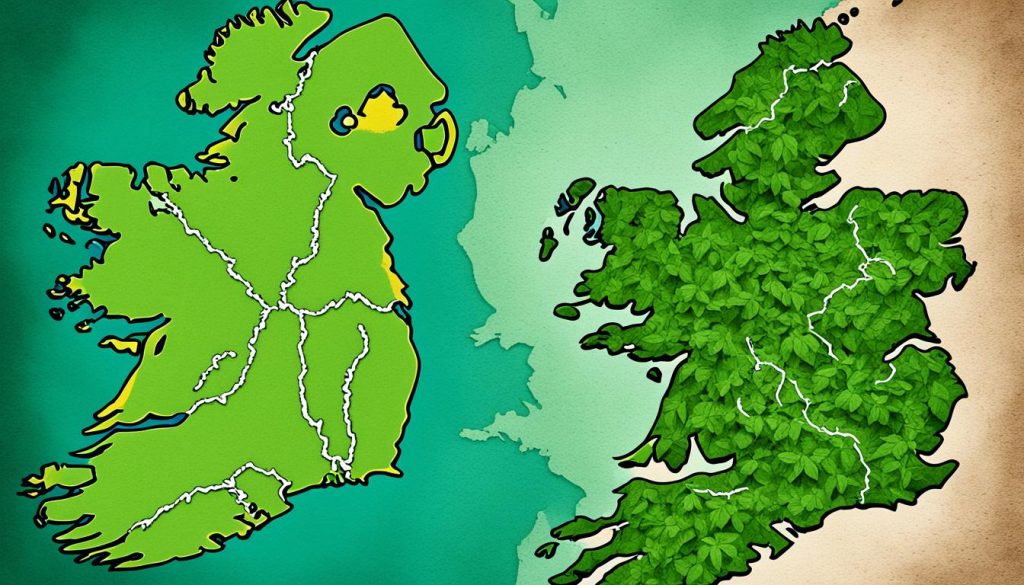Choosing where to set up a company is more crucial than ever for entrepreneurs. Many are comparing the pros of starting up in Ireland versus the UK. With Brexit, there are worries about trade barriers and extra costs.
- Introduction to Setting Up a Company in Ireland and the UK
- Economic and Political Landscape Post-Brexit
- EU Membership: A Critical Factor
- Ease of Setting Up a Company in Ireland vs the UK
- Is it Better to Set Up a Company in Ireland or UK?
- Company Structures in Ireland and the UK
- Comparing Tax Regimes: Ireland vs the UK
- Business Laws and Regulations
- Time and Cost to Register a Company
- Final Considerations for Entrepreneurs
- Source Links
Ireland, still in the EU, offers easy access to Europe for English-speaking businesses. The UK, after Brexit, is facing a lot of unknowns. Ireland is praised as the top place in Europe to start a business. But, the UK’s financial sector might lose its status because of leaving the EU.
Key Takeaways
- Post-Brexit, business establishment in Ireland may present fewer trade and tariff concerns.
- Ireland remains an attractive choice for EU market access.
- The UK faces challenges in maintaining its business hub status.
- Ireland is noted for its ease of starting a business compared to the UK.
- Entrepreneurs must consider Brexit implications on trade.
Introduction to Setting Up a Company in Ireland and the UK
Ireland and the UK are great places for starting a business. They offer company structures that many entrepreneurs find attractive. Knowing the details of setting up companies here can help a lot.
The paperwork process in both Ireland and the UK can greatly impact your decision. Each country has special benefits that might match your business goals.
Overview of Both Jurisdictions
In Ireland, the Designated Activity Company (DAC) structure is very helpful for specific business needs. Being in the EU, Ireland offers easy access to European markets and financial services.
The UK, even after Brexit, is still a major business centre. It has a strong infrastructure and a good environment for businesses. Its company registration is efficient, and it supports a variety of business activities.
Factors to Consider
Entrepreneurs thinking about Ireland or the UK have a lot to consider:
- Brexit Impact: After the UK left the EU, issues like currency changes and trade barriers have come up.
- EU Membership: Being in the EU gives Ireland a few advantages over the UK. This includes access to a big market and good trade deals.
- Business Setup Documentation: It’s important to be ready with all the needed paperwork. This makes setting up your company easier.
In the end, choosing Ireland or the UK depends on what’s best for your business in the long run.
Economic and Political Landscape Post-Brexit

The Brexit impact has changed the UK greatly. Companies face new trade barriers, making cross-border deals tough. This brings complexity and uncertainty.
Impact on UK Businesses
For UK firms, leaving the EU has been tough. They now deal with tariffs and customs checks. This is new compared to the old seamless trading.
Also, the British pound’s value changes a lot since Brexit. This makes financial planning hard. The London financial sector, once very stable, may lose to EU cities. Banks might move there.
Why Ireland Might Benefit
Meanwhile, Ireland could benefit from these changes. It’s the only English-speaking EU country left. This offers Irish businesses a big advantage.
Dublin is becoming a new financial center. Companies wanting EU market access are moving there. Plus, Ireland uses the Euro. This makes its economy seem more stable than the UK’s right now.
EU Membership: A Critical Factor
EU membership hugely shapes business strategies. Deciding to start a company in Ireland or the UK? Think about this key point. Being in the EU has lots of perks for Ireland, especially for businesses wanting smooth European operations.
Business Advantages of EU Membership
Ireland enjoys easy access to the EU’s single market. This means businesses can trade without tariffs with all EU countries. They benefit from the same rules and regulations, making trading simpler and cutting down on costs.
Trade and Tariff Concerns
In finance and exporting, tariff-free EU access is a big plus. Brexit has brought new trade uncertainties, especially for the UK. But Ireland remains stable, thanks to its EU membership. This fosters easier trade and underscores Ireland’s essential role in the EU market.
Clearly, EU membership is vital for choosing business locations. It makes Ireland a top pick for companies focusing on easy European trade.
Ease of Setting Up a Company in Ireland vs the UK

Starting a business in Ireland or the UK? You’ll need to know the different steps and paperwork required. While both countries offer a simple path, they each have their unique rules for documents and registrations.
Required Documentation
In Ireland, to start your company, you must send in Form A1 and your business’s constitution to the Companies Registration Office (CRO). This paperwork covers info about your directors, secretary, and the way shares are divided. In the UK, on the other hand, you have to apply through Companies House and include the memorandum and articles of association. These important documents spell out who started your company and its basic laws.
Registration Processes
The steps to officially register your company in Ireland and the UK are not exactly the same. In Ireland, you’ve got to pay a €50 fee to the CRO. But in the UK, it’s £12 for online applications and £40 if you’re submitting paper forms. Plus, the UK can get your company registered super fast – often in just 24 hours. Ireland might take a bit more time to get things done.
Is it Better to Set Up a Company in Ireland or UK?
Choosing between setting up a business in Ireland or the UK needs careful thought. The impact of Brexit has changed the business options in both countries. One key factor is the tax benefits each country offers.
Ireland is known for its low corporation tax rate of 12.5%, appealing to many businesses. This is much lower than the UK’s rate, which can be as high as 30%. Ireland also has tax breaks on foreign income, attractive for big businesses.
Market access is another crucial factor. Both countries are gateways to English-speaking markets. But, Ireland’s EU membership offers seamless trade and favourable policies.
In the end, choosing where to set up depends on what the business needs. Taxes, market access, and growth potential in English markets are important. A careful look at these factors will help make the right decision for your business in the post-Brexit era.
Company Structures in Ireland and the UK

The landscape of company legal structures in Ireland and the UK offers a wide selection of choices. Each is tailored to meet the specific needs of businesses. Both places have structures aimed at fitting the varied needs of entrepreneurs and corporations.
Types of Entities Available
In the UK, the most common choice is the UK Limited Company. It’s known for its solid legal protections and clear framework. Sole traders, partnerships, and limited liability partnerships are also widely chosen. Similar to this, Ireland provides options like private limited companies, partnerships, and sole proprietorships.
Both Ireland and the UK have made their company registration processes simpler. This move is appealing to both domestic and international investors. They’ve cut down on paperwork, making it easier for startups and established companies to grow.
Unique Company Structures in Ireland
A unique entity in Ireland is the Designated Activity Company (DAC). It’s meant for businesses that have specific, set goals. A DAC in Ireland offers more clarity about their business actions. This makes it a good choice for businesses that need to clearly outline their operations.
Another advantage in Ireland is it allows companies to have just one director. This is unlike the UK, which requires at least two directors. It makes things simpler for international entrepreneurs looking to start up in Ireland.
Also, in Ireland, a company secretary role can be more flexible. Companies can use outside services for this role. This helps smaller companies manage their governance more easily.
In summary, both Ireland and the UK have strong structures for businesses. Yet, Ireland’s special rules for DACs and its flexible governance stand out as key benefits for some businesses.
Comparing Tax Regimes: Ireland vs the UK
Both Ireland and the UK offer unique tax benefits for companies. Digging into each country’s tax laws can greatly influence your business choices.
Corporate Tax Rates
In Ireland, the corporate tax rate is a low 12.5%, compared to the UK’s 19%. This lower rate in Ireland could mean big savings for companies with a lot of trading income.
VAT Considerations
The UK’s VAT rate is 20% for most items, which is a bit more than Ireland’s varying rates. Firms need to get their tax planning right to save money and follow the rules.
Tax Exemptions and Incentives
Ireland gives various tax breaks, like not taxing foreign income, which can lead to huge benefits. The UK has its own tax breaks, but companies need to find out which ones work best for them.
Both countries have agreements with other nations to prevent double taxation, easing the burden on companies trading internationally.
Business Laws and Regulations

Understanding business laws is key when starting a company in Ireland or the UK. These rules are crucial for running your business right. They differ between the two, so it’s important to know these differences.
Recent Legislative Updates
In Ireland, the Companies Act 2014 has made things simpler. Now, you can have just one director in limited companies. This makes starting a company easier. On the other hand, the UK’s Companies Act 2006 has been around longer but also updates to stay modern.
Ireland’s business laws are changing often, making it easier to adapt. The UK’s law provides a stable basis for business operations.
Employment Law Differences
Employee rights matter in both Ireland and the UK. Ireland has strong laws for fair treatment. The UK uses the Companies Act and other laws to protect workers.
In both places, protecting employee rights is crucial. TUPE is an example that helps safeguard workers’ conditions during a business transfer. But, the details can vary in Ireland and the UK.
To manage these detailed laws, getting expert advice is wise. It ensures your business follows all employment laws and regulations correctly.
Time and Cost to Register a Company
Starting a business means knowing about money and time needs for registration. Entrepreneurs have to look at the fees and setup time in Ireland and the UK. This helps them make smart choices.
Registration Fees
The setup cost changes depending on the location. In Ireland, it costs about €50 to register a company with CRO Ireland. But in the UK, Companies House UK charges only £12 for registration. These fee differences can affect the start-up budget.
Processing Timelines
The time to set up a business also matters. In Ireland, it takes 3-4 days to register a company. However, the UK process, through Companies House UK, is quicker, usually done in 24 hours. Knowing these timelines helps owners plan better.
Final Considerations for Entrepreneurs
Starting a business in Ireland vs the UK needs careful thought. For those looking at the EU market, Ireland’s membership brings big advantages. These pros might outweigh any issues with how easy it is to register or cost differences.
Since Brexit, the business scene in the UK has changed a lot. The UK still offers great chances but things are not the same as before. On the other hand, Ireland stays in the EU. This makes Ireland’s economy feel more stable and safe for new businesses.
Making a strategic plan is key. Entrepreneurs have to think about market access, tax benefits, and how to run their company. They need to choose what’s best for their business dreams. As things keep changing, staying updated on both places will help them pick where to start and grow their business successfully.
Source Links
- https://kinore.com/guides/the-difference-between-irish-and-uk-company-set-up/
- https://www.eurostartentreprises.com/en/business-advice/the-differences-between-starting-a-business-in-the-uk-and-ireland
- https://www.reddit.com/r/startups/comments/v5amh1/should_i_register_my_company_in_ireland_or_the_uk/

















